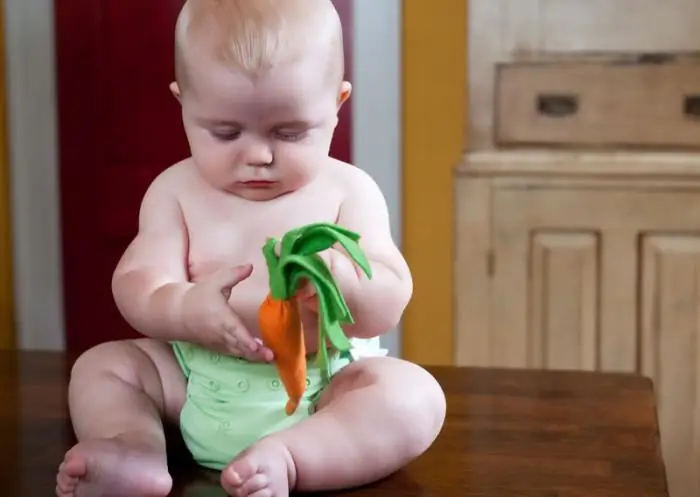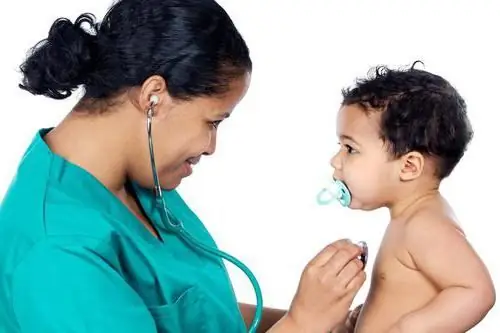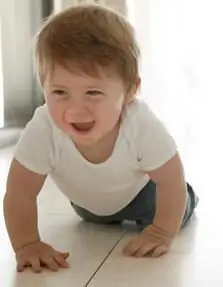2026 Author: Priscilla Miln | miln@babymagazinclub.com. Last modified: 2025-01-22 17:55:20
Each new parent of a baby is interested in how a newborn develops by months, what he should be able to do at a certain period of his life. To know if a child is developing correctly, you need to navigate the stages of development by age, which were compiled by pediatricians and neurologists.
The development of a newborn child largely depends on whether he was born on time. If the baby was born prematurely, then its gestational age should be taken into account. For example, if a child was born at eight months old, then at the beginning of his life he will lag behind by about a month in development. Usually, by the age of one, such children catch up with their peers and no longer differ from them.
The article is based on the skills of a full-term baby.

The first month of a newborn's life: development and features
So, finally, the pregnancy came to an end and you got your baby in your arms. It's time to adjust to this new life. No one says it's easy, but everyone goes through it, and try, despite being tired, to keep these touching moments.the first days of your baby's life in memory. The arms and legs of the newborn are still folded as if he is inside the mother. The average birth weight of a baby is 3600 grams for boys and 3300 grams for girls. How does he communicate with his mother? The child can grunt, sneeze and hiccup. And, of course, cry. There are two reasons for hiccups. Babies hiccup when they get cold. Also, the digestive system of newborns is not yet functioning properly. A full stomach can press on the diaphragm - this is another cause of hiccups. Don't be afraid of grunting and sneezing. This is completely normal for children. The baby may sneeze because dust has got into his nose, and he grunts because the mucus in the nose goes down the throat, so this effect is obtained.
Newborn development by weeks in the first month of life
A baby in the first week of life loses up to 10% of its weight. Don't be alarmed, it's just swelling gone, that is, he lost excess fluid. The head of a newborn in the early days may look somewhat deformed if the birth was natural. In a few days everything will be back to normal. The skull of a child has two soft spots called fontanelles. They can be seen if the baby has a high temperature or dehydration. During the first week, lactation is established in a woman. In order for the baby to eat and get more milk, it is worth putting it to the breast more often. So the baby will feel his connection with his mother. If the baby does not have enough milk, you can supplement it with formula. How to understand that the baby is not eating enough? Pay attention to the amount of urination. In a dayat least 5-8 diapers should be spent. Since the intestines in children of this age are not yet perfect, the child may experience constipation or bloating. Do not try to cure them yourself, it is better to consult a pediatrician.
One of the stages in the development of newborns is sleep. In the first and second weeks of his life, the child sleeps most of the day, waking up every 2-3 hours. Children sleep approximately 16-20 hours a day for 2-4 hours at a time. While the child does not distinguish between day and night, therefore, he wakes up at night just as often. By the end of the second week, the weight that was at birth returns. By this time, the umbilical cord is already drying up. This means that the child can be bathed. From the same age, start laying the baby on his stomach. This will help strengthen his back and neck muscles. Don't let your baby sleep on their back all the time to avoid a flat head. With a two-week-old baby, you can start going outside when the weather is comfortable. You need to start with a small five-minute walk.
By the end of the first month, there is a growth spurt. The vision of a child at 4 weeks is still developing, but he can already focus on things half a meter away from him. This means that the baby will study your face when you hold it. It's time for you to hang your mobile over your figurine bed. The baby can already turn his head from side to side, raise it, lying on his tummy, keep his hands in fists and bring them to his face. At this age, the child begins to listen to extraneous noises and voices and may even turn his head in their direction. Now you need to not only feed him,to lull, but also to entertain. While the baby may sleep more, he may cry more, especially in the evenings.

Two months
A child at this age becomes more attentive, can focus better on an object, can track a moving object, likes to look more at complex models than at simple ones that were previously hung from his crib. When you speak, your baby actively listens, even trying to answer in his own way, cooing, or moving his arms and legs, enjoying the conversation with you. He feels your touch, recognizes your face. The child becomes stronger and can already raise his shoulders when he lies on his tummy; legs straighten and become stronger. The baby can already calm himself when he sucks his fist. He begins to socialize, can answer, coo and even smile. In some cases, at the age of two months, the lower teeth may already begin to cut, but usually this happens much later, but if the baby drools, cries, has trouble sleeping, refuses to eat and tries to put his fist in his mouth, see if the gum looks inflamed. Maybe it's teething. If the child is bottle-fed, you can give him water. The duration of a night's sleep can already increase to 5-6 hours. Typically, a two-month-old baby sleeps about 15 and a half hours a night.

Three months
So, a child at three months can already recognize the faces of not only parents, but also other close people,behind moving objects, smiles when she hears her mother's voice. The child begins to babble, repeats sounds and movements. You can put a blanket on the floor and do gymnastics there. Lying on his tummy, a three-month-old baby is already raising his head and upper body, standing on his hands. The child pays attention to the toys hanging above him and can touch them with his hands or clap them, grab and shake the toy. Pay special attention if the baby does not respond to loud noises or does not smile at the sound of the mother's voice. If the baby is properly cared for, the development of the baby will be timely and correct.
Four months
Your four-month-old baby learns about the world through the senses. Now he increasingly puts his fist in his mouth, chews on toys and puts everything that interests him into his mouth. He also listens to what you say and babbles, understands the game of hide and seek and often laughs. Now the child sees objects at a distance, and not just those that are nearby. A four-month-old baby can roll over from his stomach to his back and back, rise on his elbows. He reaches for toys, is interested in them, so it is necessary that the items be varied. At 4 months, the lower teeth are already beginning to cut, so the child pulls everything into his mouth and he produces a lot of saliva. At this age, you can already begin to introduce complementary foods according to a special table. When it comes to complementary foods, it's best to talk to your pediatrician, who can advise you on where to start for your child.

Five months
From the age of five months, the baby begins to crawl, sotry not to leave him unattended. At this time, the ability to distinguish different colors is manifested. Now the baby can see the toy and grab it. Hearing the sound, the baby will turn his head. He listens to the conversations of adults and may soon begin to imitate your words. You may notice that many of his sounds are repeated. With a child, you can start playing various games, for example, patties. He now holds toys with all fingers and both hands, begins to roll or sway from side to side, preparing to roll over. If you decide to feed your baby, then take your time and carefully monitor the reaction to any product. Since you have started feeding your baby solid food, give your baby water. A five-month-old baby usually sleeps about 15 hours a night, and some babies may not wake up at night for feeding. This is normal, at this age there is a regression of sleep, some children begin to sleep less, not as deeply. After some time, the child may begin to sleep without waking up at night. Try to get the baby used to falling asleep in the crib, and not in your arms. Proper care and development of the newborn will be carried out by pediatricians.
Half a year
So your baby is 6 months old. Congratulations on being halfway through your baby's first year. The kid becomes more stubborn, his personality manifests itself. He may not like a stranger or, conversely, he may smile at him. Also, the child begins to develop eating habits, likes and dislikes when new tastes are introduced. The baby already reacts to his name, showsexcitement when you call him. At this age there is a sharp growth and weight gain. The child examines things and toys more carefully. Most children quickly react to noise, immediately turning their heads to the sound, they begin to distinguish between male and female voices. The child is interested in different textures and shapes, he often touches his body now. The kid is already beginning to babble vowel sounds and some consonants, often laughs, knows how to lift small objects, pressing his hand to him. Some children at this age are already starting to sit up, but with some help. If a child cries more than usual, and his gums are swollen, then teeth are being cut. Sometimes a baby may refuse a bottle because of this. Complementary foods are already being introduced with might and main. Do not forget that solid food must be mashed with a blender, otherwise the child may choke. The baby begins to sleep less and play more. Toys should become more varied, you can offer him simple musical instruments such as maracas. Give your child an old magazine or a book that you don't mind tearing apart, and you will see that he has learned to turn the pages. The norms for the development of a newborn by months now also apply to premature babies.

Seven months
A 7-month-old baby is already crawling, so you need to prepare so that the house is appropriate and safe. The baby's hearing is fully developed: when you speak, he knows where you are; can copy the tone of your voice to the sound of your voice, babbles a lot. The child can sit without any assistance, he transfers the weight to his legs,when you hold it upright.
Eight months
The child has become very observant, perfectly understands what surrounds him and what is happening around him; he can better distinguish between distance and depth, which gives him the opportunity to reach out and take things. At this age, the child already sits by himself, many children crawl, but some babies skip the process of crawling and immediately learn to walk.
Nine months
Your nine-month-old baby is already sitting with or without support, pulling up, standing, clapping, and most likely crawling. He also learns to pick up objects with his index finger and thumb. Vision is getting better, now he can see the whole room well. The child easily recognizes familiar faces and objects. You can play a game: show a few things, and then hide one of them, and he will look for the hidden thing. The kid recognizes familiar sounds, understands the words that he often hears: "eat", "mom", "dad" and so on. Your nine-month-old baby may hold on to a couch or coffee table to stand up, walk with support, and hold on to furniture. He has been sitting for a long time, playing with rattles or other objects, easily using the grip with his index finger and thumb.

Ten months
At 10 months, the baby becomes smarter. He remembers where his favorite games and toys are and understands when you give him simple directions. The kid loves to play and knows how to fold the handles in finger games. The child is not only able to hearordinary sounds, but also recognizes them, his own voice and the voice of his parents, sister or brother, the sound of a closing door, and so on. May not pay attention to noise that is not important to him. Now the baby knows how to control his hands and toys: if he rattles, he shakes it, if he sees a button, he presses it. He sits for as long as he needs, and can stand, holding on to a piece of furniture. Some children begin to speak simple words like "mom" and "dad".
Eleven months
An eleven-month-old baby is already a person, and you can understand what kind of character he has. The toddler learns to observe and figure out how to react to things he encounters. The kid sees faces at a distance of up to 20 meters, observes moving objects, absorbs information from the world around him. The child's fingers directly attract trouble: he wants to poke, tear and check everything by touch. The child crawls well. Some children can already walk on their own. Baby recognizes objects and points to them when you ask where they are.

Twelve months
Finally, the baby is one year old. If your child isn't walking yet, don't worry. Approximately one in four children at this age begins to walk. Many - only after the first birthday. The kid is socialized, he can wave "hello" and shake his head at the word "no". The child loves the feeling of different textures and new experiences, understands commands if you ask to pick up the ball or look at the dog. Many children at this age are already moving to a common table,that is, they eat almost all foods, and the child receives a varied diet.
Recommended:
6 months baby: development, weight and height. The daily routine of a child at 6 months

Here comes the first little anniversary. Looking at a six-month-old child, we see already noticeable changes in him, he is no longer a newborn baby, but a little man with meaningful actions. The daily routine of a 6-month-old child is already changing significantly, the baby is more active, developed, and curious. The development of a baby at six months contains many unforgettable moments that parents will remember for a long time
Nutrition for children at 11 months: diet, recipes and menus. Baby at 11 months: development, nutrition and care

Moms of babies in their first year of life have a lot of questions. So, parents are interested in the development of the baby, whether he eats right, and so on. If there is a child in your house, at 11 months development, nutrition, care should be appropriate for this age
Child development at 11 months: new skills. Child 11 months: development, nutrition

Your baby is preparing for the first anniversary in his life - he is already 11 months old! He learns to perform new actions, slowly begins to speak, tries to move independently, eat. At this time, the child learns a lot of new and unknown things. What should a baby be able to do in his 11 months and how to care for him?
How to develop a baby at 3 months? Child development at 3 months: skills and abilities. Physical development of a three-month-old baby

The question of how to develop a child at 3 months is asked by many parents. The increased interest in this topic at this time is especially relevant, because the baby is finally starting to show emotions and is aware of his physical strength
At 8 months, what should a baby be able to do? Baby development calendar at 8 months

Worry about your baby's development? In this article, you will learn all the basic skills that your child should have at eight months of age

